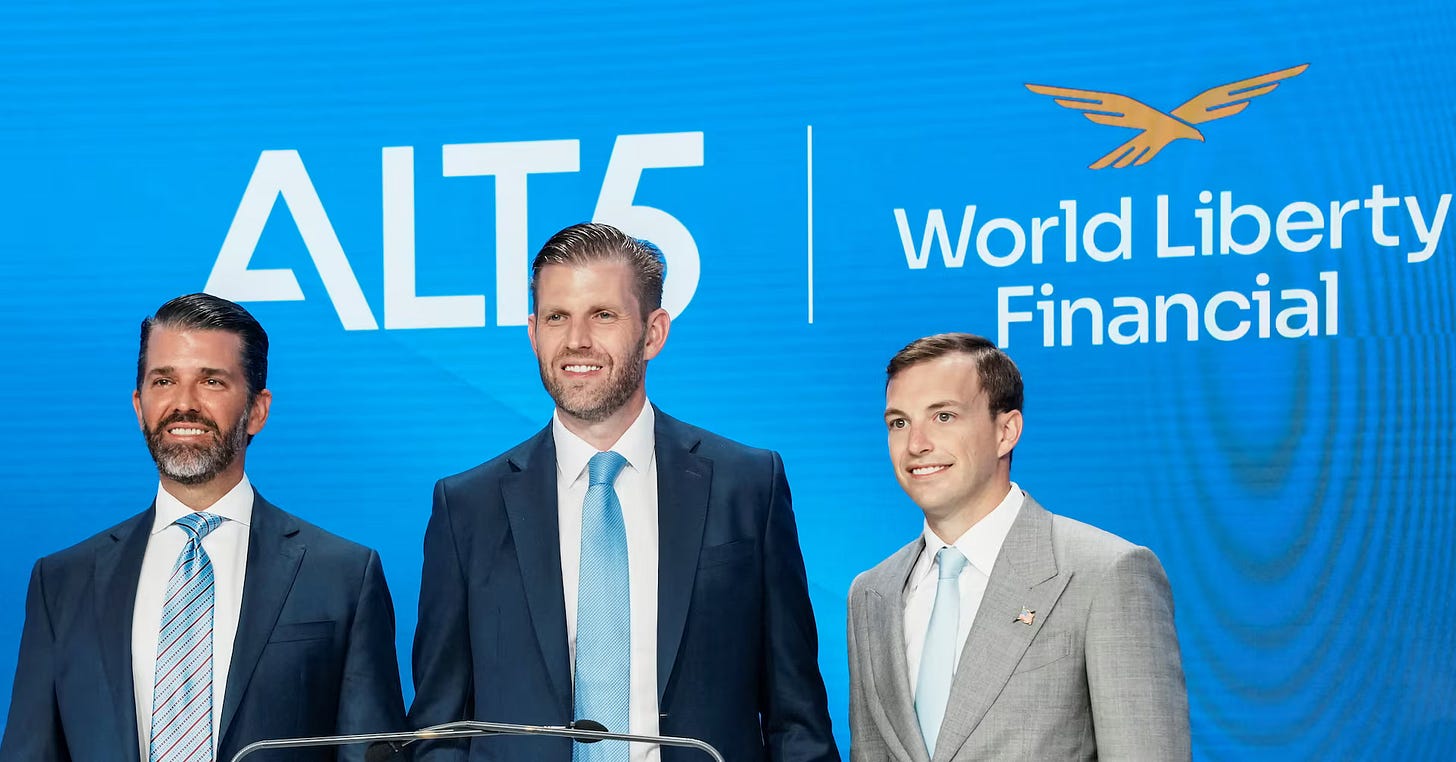The Crypto President: When Power Becomes Profit
How Trump’s $1 Billion Crypto Empire Exposes the Collapse of Accountability
I. From Cash Crisis to Crypto Empire
9 months into his second presidency, Donald Trump has done what no U.S. president in modern history has accomplished. He turned political power into direct personal profit.
The Financial Times reports that the Trump family made over $1 billion in pre-tax gains from crypto ventures. Their empire spans meme coins, stablecoins, decentralized finance platforms, and even a national Bitcoin fund.
This was not luck. It was policy. Trump’s administration replaced SEC leadership with crypto-friendly figures, dropped lawsuits against Coinbase and Ripple, and framed Bitcoin as a symbol of American freedom. Markets surged. So did Trump’s family wealth.
II. Conflict of Interest or State Capture
Being president means serving the public. But when a president’s family builds a private business empire that profits from his own laws, it is not service. It is self-dealing.
The Trump family placed its assets in a revocable trust, not a blind one. That means Trump can access profits after leaving office. Ethics experts call this structure a national scandal in disguise.
This is not entrepreneurship. It is policy converted into equity. It is the quiet merging of state power and private profit.
III. The Mirage of Crypto Wealth
Behind the glossy branding of TRUMP, MELANIA, and WLFI, the risk is real.
Meme coins are gambling tokens. Prices spike 400 percent in a week, then crash overnight. Retail buyers are the exit liquidity.
The USD1 stablecoin, issued by Trump’s son’s company World Liberty Financial, claims to be backed by dollars. Yet there is no public audit, no transparency on reserves, and no guarantee against collapse.
Even the so-called DeFi platforms under Trump-linked entities grant insiders oversized voting power. Decentralization becomes a marketing term for centralized control.
IV. Foreign Money and Hidden Hands
This is no longer a domestic story. It is a geopolitical one.
Foreign sovereign funds from Abu Dhabi and the UAE invested hundreds of millions into Trump-linked projects. Among the key private players is Sun Yicheng, an international crypto billionaire once charged with fraud before the case was quietly dropped soon after his 75 million dollar investment in Trump’s crypto firm.
Months later, Sun attended a private dinner with Trump and pledged another 100 million dollars into TRUMP tokens. The line between investor and policymaker no longer exists.
When the head of state profits from investors who depend on his policies, democracy stops being governance. It becomes a trading desk.
V. Untraceable Profits
Crypto moves in silence. Once profits enter private wallets, neither Congress nor the IRS can follow.
A billion dollars can scatter across shell accounts, routed through offshore mixers, and resurface in private trusts. No paper trail. No oversight.
That is why every U.S. president before Trump used blind trusts. Without that wall, the presidency turns into a hedge fund with nuclear codes.
VI. When Oversight Fails
When regulators become shareholders, when the SEC takes direction from the Oval Office, when policy becomes investment strategy, the people lose.
Financial risk flows downward. Retail traders take the losses. Pension funds absorb the shock. Public trust erodes.
Most Trump supporters still believe he makes no money from his presidency. That delusion protects him. When citizens mistake corruption for competence, democracy rots quietly from within.
VII. The Lesson
This is not about innovation. It is about power unrestrained.
Crypto was meant to decentralize money. Under Trump, it became the most centralized project of all, built on faith, loyalty, and illusion.
A government that trades its integrity for liquidity no longer governs. It speculates.
And in this new economy, citizens are not participants.
They are the product.




The ability of the herd mentality to ignore pernicious developments is astounding. But I also still hear people saying the $37 trillion debt isn't a problem, "Oh I've been hearing that complaint for 40 years now...". The problem is if it will be too late when the multitudes have sobered up.